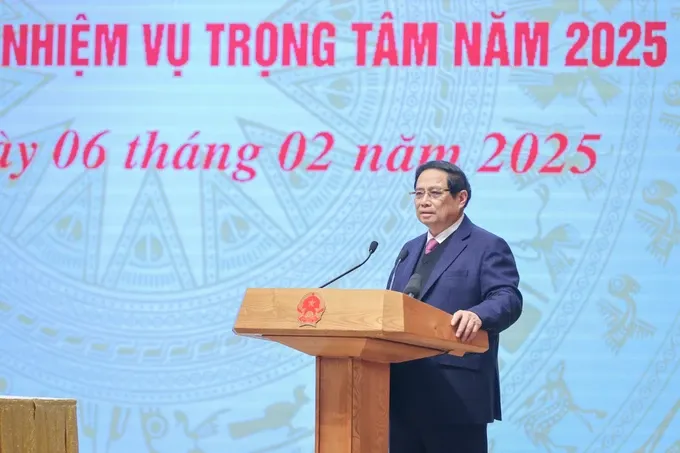
This was heard at this afternoon’s meeting aimed at reviewing the National Committee on Digital Transformation's activities and the Project 06 presided by Prime Minister Pham Minh Chinh, who also serves as the Chairman of the committee. This project focuses on the development of applications utilizing population data, identification, and electronic authentication to facilitate national digital transformation in 2024, along with outlining key directions and tasks for 2025.
In its report on national digital transformation in 2024 at the meeting, the Ministry of Information and Communications said that Vietnam has risen to 71st place out of 193 countries in the United Nations e-Government rankings which was announced in September 2024, up 15 places compared to 2022. According to the Ministry, this is the first time Vietnam has been ranked in the group of countries with a high EGDI.
Vietnam has made significant strides in institutional reform, successfully addressing many long-standing bottlenecks and creating a more dynamic and conducive environment for economic growth. This progress has been further supported by the substantial expansion and development of the nation's digital infrastructure.
Vietnam has successfully auctioned frequencies for the first time in 15 years, adding 300MHz for 5G to enhance mobile broadband quality. This achievement positions Vietnam as one of the few developing nations to discontinue 2G subscriber services, with only approximately 0.2 percent of subscribers remaining, significantly lower than the average of 2 percent-5 percent seen in other countries.
A significant milestone has been achieved with the recent commissioning of a new submarine cable line, the sixth to be deployed in Vietnam and currently boasting the highest capacity at 20Tbps. This critical infrastructure upgrade will serve to significantly enhance internet speeds and ensure the long-term sustainability of Vietnam's international internet connectivity. Notably, the rate of fiber optic internet penetration has reached a remarkable 82.4 percent, exceeding the 2025 target of 80 percent.
Furthermore, digital data and digital platforms continue to be built and developed. Data transactions via the national data sharing integration platform will increase by 57 percent, from 647 million in 2023 to 1,013 million transactions in 2024.
Concerning digital governance, the proportion of online records across the country is projected to rise to 45 percent, marking a 2.5-fold increase from 2023. The National Public Service Portal is expected to maintain its effectiveness, offering 4,475 integrated procedures, which accounts for 70.8 percent of all administrative processes. Starting in July 2024, the implementation of VNeID for logging in and accessing online public services—estimated at approximately 425,000 uses per day—will enhance convenience for both individuals and businesses.
Regarding the digital economy, the proportion of the digital economy in 2024 is estimated to reach 18.3 percent of GDP, with a growth rate exceeding 20 percent/year, 3 times higher than the GDP growth rate, the fastest in Southeast Asia. Retail e-commerce reached a revenue of US$25 billion, an increase of about 20 percent. Vietnam is in the top 10 countries with the highest e-commerce growth rate in the world. The annual growth rate of cashless payments increased by more than 50 percent, leading Southeast Asia.
Last but not least, over 55.25 million citizens have activated VNeID accounts exceeding the target of 40 million user accounts in the Project 06; plus, 90 percent of people participating in insurance have electronic health books and all students have digital learning records. Moreover, all hospitals, public health centers, and higher education institutions implement cashless payments.
Vietnam has made significant strides in information security, climbing eight positions from 25th to 17th among 194 countries, placing it in Group I - role model. Additionally, it ranks 4th out of 38 countries in the Asia-Pacific region. The country's total IT workforce has reached 561,000 individuals, representing 1.1 percent of the overall workforce.
Despite significant progress, several challenges are still existing. For instance, the rate of online public service record usage remains relatively low, while the adoption of digital signatures continues to lag behind expectations. Data remains fragmented and underutilized due to limitations in data sharing and integration across sectors. Moreover, many ministries, agencies, and localities have yet to clearly define and implement comprehensive digital transformation strategies. Furthermore, the evolving landscape of cybersecurity threats, including sophisticated online fraud and transnational cyberattacks, presents significant challenges.
The Ministry of Information and Communications unveiled that the theme of national digital transformation in 2025 is ‘Comprehensive digital transformation to develop the digital economy, creating new momentum for economic growth’.
Speaking at the meeting, Prime Minister Pham Minh Chinh said that the Government and the Prime Minister have resolutely directed and synchronously deployed solutions to increasingly effectively and practically implement the national digital transformation recently by promoting digital transformation in most areas. At the same time, all organizations nationwide carried out the Project 06 which have received advocacy of people and businesses.
That has contributed to changing management methods and improving the quality and efficiency of citizen management; saving time and effort, limiting negativity and petty corruption as well as creating an important foundation for deploying online public services.
The Prime Minister acknowledged that while significant advancements have been made, achieving the ambitious goals of national digital transformation and Project 06 will require sustained effort and concerted action. The Prime Minister highlighted that some tasks are currently behind schedule, while others face significant risks of falling short of their objectives. He emphasized that overcoming these challenges necessitates strong, persistent, and consistent direction and implementation efforts from all levels, from the central Government to the grassroots level, to ensure the successful implementation of these critical national priorities.
























